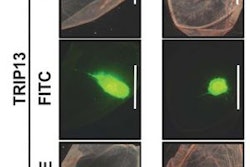
Mouse models of human oral cancer treated with capsazepine showed dramatic tumor shrinkage without damage to surrounding tissues, according to a new study in Oral Oncology (May 2014, Vol. 50:5, pp. 437-447).
Late diagnosis, low survival
Oral squamous cell carcinoma is the eighth most common cancer in the U.S. with 40,000 new cases and nearly 8,000 deaths reported annually.
 Cara Gonzales, DDS, PhD.
Cara Gonzales, DDS, PhD."These tumors develop primarily on the side of the tongue," stated lead study author Cara Gonzales, DDS, PhD, an assistant professor of comprehensive dentistry and an investigator with the Cancer Therapy & Research Center at the University of Texas Health Science Center at San Antonio, in a press release. "Unfortunately, 60% of patients have large tumors before seeking help, and their five-year survival rate is as low as 30%."
Capsazepine is a synthetic analogue of the sensory neuron excitotoxin capsaicin. It was developed to block transient receptor potential vanilloid type 1 (TRPV1), a calcium channel found in pain-sensing neurons. When TRPV1 is activated, a pain signal is sent to the brain. Capsazepine may reduce oral cancer pain because it blocks tumor-secreted factors from stimulating TRPV1 on these neurons.
The researchers found that capsazepine also has anticancer activity that may be associated with its ability to increase oxidative damage in tumors. Enhanced oxidative stress leads to autodestruction of tumor cells, they theorized.
TRPV1 is a member of the transient receptor potential family that is activated or sensitized by a variety of endogenous stimuli as a result of tissue injury and inflammation. TRPV1 is upregulated during inflammation and plays a role in pain perception. Capsazepine is a competitive antagonist of TRPV1.
"Here's the beauty," Dr. Gonzales said. "Capsazepine kills cancers selectively, leaving normal tissues alone, and also acts on neurons to block pain, a desirable combination in a potential medication."
Hope for future: Systemic administration
So far, only local administration of capsazepine directly into the primary tumors has been tested. But many patients with oral cancer have disease that has spread.
"We would like to be able to deliver this therapy systemically to target metastatic disease," Dr. Gonzales said. "Our laboratory is working with the Center for Innovation in Drug Discovery, a partnership between the Health Science Center and the University of Texas at San Antonio, to develop novel drugs that are similar to capsazepine with improved efficacy for the purpose of systemic administration to treat tumors that are inaccessible to local injection or that have metastasized."
Randal Otto, MD, a professor and the chairman of the department of otolaryngology--head and neck surgery at the Health Science Center, stated: "These tumors, if identified and treated early, are definitely curable. Unfortunately, most patients present with advanced disease with the cancer involving critical structures. This markedly decreases the chance for cure and dramatically increases the risks associated with treatment. Anything that selectively attacks the tumor while not injuring the normal tissues can only help the patient."
The Health Science Center has claimed intellectual property on results of the study.



















